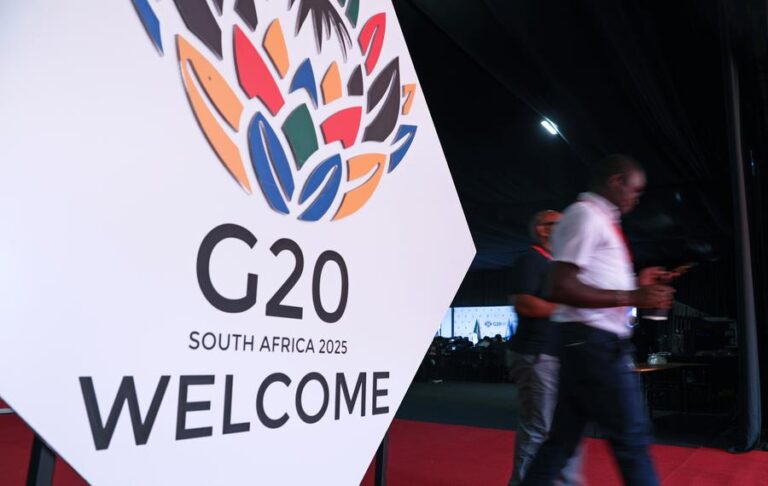Chrispin Phiri, a spokesperson of South Africa’s Department of International Relations and Cooperation (DIRCO), said that the United States’ absence negates its role over the G20’s conclusions, reiterating that Pretoria would not be bullied. “We cannot allow coercion by absentia to become a viable tactic,” he said. “It is a recipe for institutional paralysis and the breakdown of collective action.”
JOHANNESBURG, Nov. 23 (Xinhua) — The 20th Group of Twenty (G20) Summit on Saturday adopted a declaration calling for strengthening multilateralism and fostering equitable global governance, despite the boycott of the United States.
“The G20 Presidency has culminated into a progressive declaration … that will revolutionize how the Global South participates and plays in the global economy,” South African International Relations and Cooperation Minister Ronald Lamola said following the announcement of the declaration.
The 122-point declaration, titled “G20 South Africa Summit: Leaders’ Declaration,” underscores the need to address global challenges through multilateral cooperation and calls for stronger support for developing countries to advance inclusive growth and sustainable development.
Although G20 members unanimously endorsed the declaration, the United States, which refused to attend the summit, has said that it would reject any outcome document presented as a G20 consensus without its consent.
Tensions between South Africa and the United States have escalated since the start of the year. The U.S. administration froze its assistance to South Africa, alleging that the Expropriation Act, a land reform law signed by President Cyril Ramaphosa in January, “discriminates” against white South Africans.
Observers said that South Africa angered the United States in December 2023 when it brought a case before the International Court of Justice, accusing Israel of committing “genocide” against Palestinians in Gaza. Bilateral relations have remained strained throughout this year.
Citing what it called discriminatory land policies against white South Africans, Washington first cut development assistance to Pretoria and later expelled the South African ambassador.
In August, the U.S. government imposed a 30 percent tariff on South African goods, making South Africa the sub-Saharan African country facing the highest U.S. tariff rate.
The South African government rejected Washington’s accusations as lacking “factual accuracy and failing to recognize South Africa’s profound and painful history of colonialism and apartheid.”
Throughout this year, the United States has repeatedly said that no officials would attend the summit.
South African G20 Sous-Sherpa Xolisa Mabhongo confirmed receiving a letter from the United States ahead of the summit, in which Washington said it would only accept a “chair’s statement” reflecting a lack of consensus.
In response, Chrispin Phiri, a spokesperson of South Africa’s Department of International Relations and Cooperation (DIRCO), said that the United States’ absence negates its role over the G20’s conclusions, reiterating that Pretoria would not be bullied.
“We cannot allow coercion by absentia to become a viable tactic,” Phiri said. “It is a recipe for institutional paralysis and the breakdown of collective action.”
Vincent Magwenya, spokesperson for President Ramaphosa, told reporters on Saturday at the media center that “the mere fact that we have an agreed declaration shows that the world is embracing multilateralism, and the world is embracing cooperation and collaboration.”
Stressing the multi-polar world is in real action, Lamola said: “The world is here, the African continent is here, global institutions are here. Multilateralism has been affirmed.”
Frank Lekaba, a senior lecturer of Wits School of Governance at the University of Witwatersrand Johannesburg, hailed the adoption of the declaration as a win for Africa.
“I think it already reasserted the centrality of the G20 and the legitimacy of the G20 and the South African presidency,” said the expert.
South Africa assumed the rotating G20 presidency on Dec. 1, 2024, becoming the first African nation to hold the position. The United States is scheduled to take over the presidency on Dec. 1, 2025.
However, White House Press Secretary Karoline Leavitt told reporters at Thursday’s briefing that only a U.S. envoy would attend the presidency handover ceremony at the end of the summit.
Magwenya on Saturday reiterated at the media center that the South African president will not hand over to a junior embassy official. “It is a breach of protocol that is not going to be accommodated or allowed in this instance. It is a position of principle.”
“America chose to boycott the summit. That is their choice and that is their prerogative to do so. But what cannot happen is a breach of protocol being forced,” he noted.
Briefing the reporters after the first session of the summit, Lamola said that the United States has to collect the G20 presidency from the DIRCO offices.
“No one will steal that spotlight. The African continent has made it,” said the South African foreign minister, highlighting the summit as an opportunity to shine a spotlight on the African continent. ■

